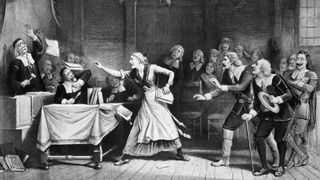
Worldwide, more than four in 10 people believe in witchcraft, a new survey suggests.
However, witchcraft, or the concept that people can use supernatural abilities to cause harm is a belief that varies dramatically between nations. Just 9% of people in Sweden believe in witchcraft, while more than 90% of people in Tunisia believe some people hold malevolent powers, the study found.
Belief in witchcraft may be as old as humanity itself. England's oldest cave art, for instance, may be "witch marks" etched to ward off evil spirits, while the oldest written instance of the Hebrew name of God is found on a 3,200-year-old "curse tablet," meant to hex someone who broke a vow. The notion that humans can cast curses is present in most major world religions, including Christianity, Judaism, Islam and Hinduism, a 2021 Pew Research Center survey found (opens in new tab).
Related: Sacred chickens, witches and animal entrails: 7 unusual Roman superstitions

In the new study, researchers used a vast dataset collected over six waves between 2008 and 2017 by the Pew Research Center. Overall, 140,000 people across 95 countries and five continents were asked a series of questions related to their belief in magic, such as, "Do you believe in the evil eye, or that certain people can cast curses or spells that cause bad things to happen to someone?" (One glaring limitation of the study: it did not survey anyone in India or China, which collectively are home to roughly 2.8 billion people.)
Based on the Pew sample, the researchers estimated that at least 1 billion people worldwide believe in witchcraft. Women, urban residents and younger people were more likely to believe in such supernatural powers. However, having more education, more financial security, and living in a smaller household typically accompanied a reduced belief in witchcraft. Still, such beliefs were nonetheless found in people across the educational and socioeconomic spectrum.
For instance, people with a "very good" economic situation were only 6% to 7% less likely to believe in witchcraft than people with "very bad" economic situations, according to the study, which was published Nov. 23 in the journal PLOS One (opens in new tab).
And unsurprisingly, those who were religious tended to be more likely to believe that some humans possess magical powers.
"Overall, religious and witchcraft beliefs, both centered on the key role of supernatural powers in life, go hand in hand," the researchers wrote in the study.
Related: Were any witches burned at Salem?
People in countries with weak institutions, low levels of social trust, greater emphasis on conformity and greater bias toward people in the "in group" were also more likely to believe in witchcraft.
That aligns with past anthropological work studying American Indigenous people in the Navajo Nation, also known as the Diné, according to the new report. That prior research proposed that among Navajo people, belief in witchcraft served as a tool of social control that helps maintain order in a society when formal governance structures are absent or weak, the researchers wrote in the study.
Live Science newsletter
Stay up to date on the latest science news by signing up for our Essentials newsletter.

Tia is the managing editor and was previously a senior writer for Live Science. Her work has appeared in Scientific American, Wired.com and other outlets. She holds a master's degree in bioengineering from the University of Washington, a graduate certificate in science writing from UC Santa Cruz and a bachelor's degree in mechanical engineering from the University of Texas at Austin. Tia was part of a team at the Milwaukee Journal Sentinel that published the Empty Cradles series on preterm births, which won multiple awards, including the 2012 Casey Medal for Meritorious Journalism.
Most Popular

By Harry Baker

By Ben Turner

By Jamie Carter